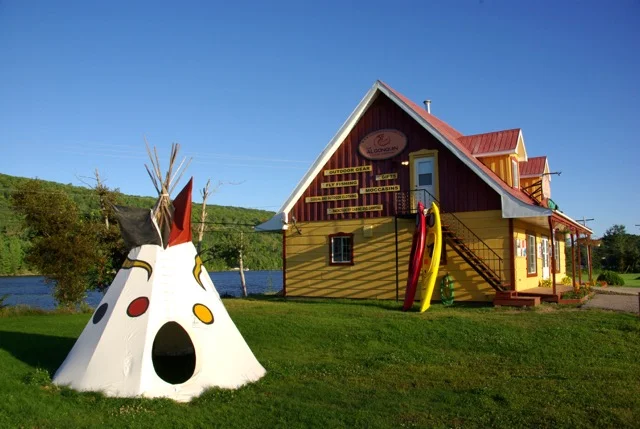In the 1990s, when the WLFN faced critical mill and plant shut downs in the regional forest industry, WLFN began to focus on community-based eco-tourism initiatives as a means of diversifying its economic base and employment structure. With this intent, in 1997 the band purchased a former tourism information centre building on Long Sault Island on the Ottawa River and converted it into a native craft store. In 1998, the Timber Train, a summer tourist train attraction along the Ottawa River between Mattawa and Temiscaming engaged WLFN as a receptive tour operator for their summer tourism train clientele. WLFN offered tourists the option of purchasing a traditional Algonquin lunch of moose stew and bannock and cultural tour. Three years later the Timber Train went into receivership over management issues outside of WLFN’s control. Despite the short duration of their venture with the Timber Train, WLFN had learned that culture based tourism products enjoy high demand, and can be marketed successfully, that WLFN members had the capacity to work in the field of tourism and manage businesses themselves. In 2002, the community adopted a 10-year comprehensive tourism development strategy to develop community owned and operated tourism facilities and products. In 2004, the community launched its own new venture converting the craft store location into the Algonquin Canoe Company as the first step of the multi-phase initiative to establish ecotourism as a supplementary component of its social, economic and cultural development. Since then, the Algonquin Canoe Company has established itself at two locations in both provinces, andmaintains and outfits over 500 km of traditional Algonquin canoe routes in the Ottawa River Basin. Under the same tourism strategy, the band purchased a tourism fishing lodge, restaurant and bar on Lake Kipawa (2011) and the Nanabush Cafe and Laundromat in Swisha (2014). All businesses are located at key access points where Algonquin employees can maintain their presence as ambassadors to the territory.
Algonquin Canoe Company – two locations servicing Algonquin traditional waterways
Sitting right along the edge of the Ottawa River, the Algonquin Canoe company offers a variety of services including outdoor equipment rentals (canoes, kayaks, mountain bikes), paddling routes, information for accommodated camping, and a store filled with Indigenous crafts, medicines, and art. For more information, go to www.algonquincanoe.com.
Camp LaLucarne
Located next to the vacation village of Laniel, Camp LaLucarne is the choice destination for nature and adventure enthusiasts who want to explore the unique riches the Temiscamingue region has to offer. Discover lush woodlands, abundant wildlife, breathtaking scenery, all along the thousand miles of shoreline of legendary Lake Kipawa. For more information, go to www.camplalucarne.com/en_home.php.
Nanabush Cafe
Resting in the tiny territory of Swisha, Quebec is Wolf Lake’s Nanabush cafe, offering crepes, coffee, and laundry facilities. The Nanabush cafe works along the Dumoine river where one can rent canoes, and whitewater/flat river raft. The Dumoine River is a first class river as it has never has been dammed. For more information go to www.algonquincanoe.com/nanabush-cafe/.
All of Wolf Lake First Nation’s businesses are established at strategic points to enter Quebec, giving the band a strong and well-known presence.



